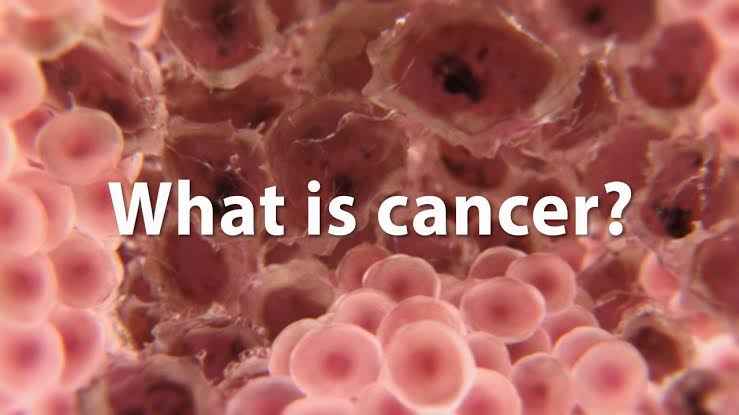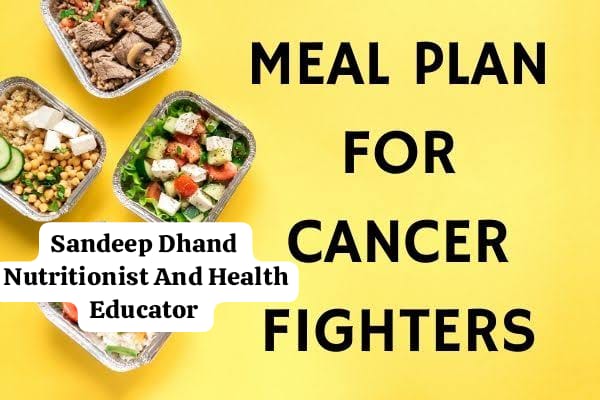Sandeep Dhand
Nutritionist And Health Educator
Cancer is a disease where some of the body’s cells grow uncontrollably and spread to other parts of the body. Normally, cells grow and divide to form new cells as the body needs them. When cells grow old or become damaged, they usually die, and new cells take their place. However, in cancer, this process breaks down. Damaged cells survive when they should die, and new cells form when they are not needed. These extra cells can form a mass called a tumor. Not all tumors are cancerous, but malignant ones can invade nearby tissues and spread to other parts of the body.

Types of Cancer
There are over 100 types of cancer, and they can affect almost any part of the body. Below are some common types:
- Breast Cancer
Affects the cells in the breast. It is more common in women but can also occur in men. - Lung Cancer
Usually linked to smoking, it starts in the lungs and can spread to other parts of the body. - Prostate Cancer
Found in men, it affects the prostate gland, which produces seminal fluid. - Skin Cancer
Includes types like melanoma, which affects the skin cells. Excessive exposure to the sun is a significant risk factor. - Colon and Rectal Cancer (Colorectal Cancer)
Develops in the colon or rectum and often begins as small growths called polyps. - Leukemia
A cancer of the blood and bone marrow. It doesn’t form solid tumors but affects the production of healthy blood cells. - Liver Cancer
Usually caused by chronic liver diseases like hepatitis or excessive alcohol consumption. - Pancreatic Cancer
Affects the pancreas and is often detected in later stages. - Cervical Cancer
Develops in the cervix and is mostly caused by the Human Papillomavirus (HPV). - Brain and Spinal Cord Tumors
Affect the central nervous system. They may be benign or malignant.
Stages of Cancer
Cancers are categorized into stages based on their size and spread:
Stage 1: Small and localized. Hasn’t spread to other tissues.
Stage 2: Larger but still localized. It may involve nearby lymph nodes.
Stage 3: More advanced and spread to nearby tissues or lymph nodes.
Stage 4 (Metastatic): Spread to other parts of the body.
Causes of Cancer
Lifestyle Factors: Smoking, poor diet, and lack of exercise.
Genetic Factors: Inherited genetic mutations.
Environmental Exposure: Radiation, chemicals, or viruses like HPV.
Chronic Infections: Hepatitis B and C can lead to liver cancer.
Age: Risk increases with age.
Importance of Diet in Fighting Cancer
A healthy diet plays a crucial role in managing and even preventing cancer. While it cannot cure cancer, good nutrition helps strengthen the immune system, maintain energy levels, and support overall health during treatments like chemotherapy or radiation.

Foods to Include
- Fruits and Vegetables
Rich in vitamins, minerals, and antioxidants.
Examples: Berries, oranges, broccoli, carrots, spinach.
- Whole Grains
High in fiber, which may reduce the risk of colorectal cancer.
Examples: Brown rice, quinoa, whole wheat.
- Lean Proteins
Essential for muscle repair and immune health.
Examples: Chicken, fish, beans, and lentils.
- Healthy Fats
Omega-3 fatty acids reduce inflammation.
Examples: Salmon, walnuts, and flaxseeds.
- Herbs and Spices
Turmeric has anti-inflammatory properties.
Garlic and ginger may also have cancer-fighting effects.
Foods to Avoid

- Processed Foods
High in preservatives and chemicals. - Sugary Drinks and Foods
Excess sugar can lead to weight gain and inflammation. - Red and Processed Meats
Linked to colorectal and stomach cancers. - Alcohol
Excessive consumption increases the risk of several cancers.
Sample Diet Plan for Cancer Patients
Morning
Warm water with lemon.
A bowl of oatmeal with fresh berries and a handful of nuts.
Mid-Morning Snack
A smoothie made with spinach, banana, and almond milk.
Lunch
Grilled fish or tofu with a side of quinoa and steamed broccoli.
A green salad with olive oil dressing.
Afternoon Snack
An apple with almond butter or a handful of seeds.
Dinner
Lentil soup or baked chicken with roasted sweet potatoes and green beans.
Before Bed
A cup of chamomile tea or a piece of dark chocolate (70% cocoa or higher).
Preventive Tips for Cancer
- Quit Smoking: Reduces the risk of lung and other cancers.
- Stay Active: Aim for at least 30 minutes of exercise daily.
- Maintain a Healthy Weight: Helps lower the risk of breast and colon cancer.
- Protect Skin from UV Rays: Use sunscreen and wear protective clothing.
- Get Vaccinated: For HPV and Hepatitis B.
- Regular Screenings: Early detection improves survival rates.
Conclusion
Understanding cancer, its types, and preventive measures can empower individuals to lead healthier lives. While cancer can be a challenging diagnosis, a balanced diet and lifestyle adjustments can make a significant difference in managing and even preventing the disease. Always consult healthcare professionals for personalized advice.